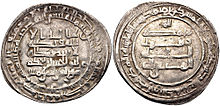Bajkam
| Abū al-Husayn Bajkam al-Mākānī | |
|---|---|
| أبو الحسين بجكم المكاني | |

|
|
| amir al-umara of the Abbasid Caliphate | |
|
In office September 938 – 21 April 941 |
|
| Monarch | ar-Radi, al-Muttaqi |
| Preceded by | Muhammad ibn Ra'iq |
| Succeeded by | Kurankij |
| Personal details | |
| Died | 21 April 941 |
Abū al-Husayn Bajkam al-Mākānī (Arabic: أبو الحسين بجكم المكاني), referred to as Bajkam, Badjkam or Bachkam (from Bäčkäm, a Persian and Turkish word meaning a horse- or yak-tail), was a Turkish military commander and official of the Abbasid Caliphate. A former ghulam of the Ziyarid dynasty, Bajkam entered Abbasid service following the assassination of the Ziyarid ruler Mardavij in 935. During his five-year tenure at the Caliphate's court at Baghdad, he was granted the title of amir al-umara, consolidating his dominance over the Caliphs ar-Radi and al-Muttaqi and giving him absolute power over their domains. Bajkam was challenged throughout his rule by various opponents, including his predecessor as amir al-umara, Muhammad ibn Ra'iq, the Basra-based Baridis, and the Buyid dynasty of Iran, but he succeeded in retaining control until his death. He was murdered by a party of Kurds during a hunting excursion in 941, shortly after the accession of al-Muttaqi as Caliph. Bajkam was known both for his firm rule and for his patronage of Baghdad intellectuals, who respected and in some cases befriended him. His death led to a void in central power, resulting in a brief period of instability and fighting in Baghdad.
Details of Bajkam's early life are unknown. He was one of the ghilman (military slaves, usually of Turkish origin) of the Daylamite warlord Makan ibn Kaki in northern Iran. Makan took care of the young Bajkam's training and education, something for which the latter showed his gratitude by adopting his patron's name as his nisba (surname). After Makan, Bajkam entered the service of Mardavij, founder of the Ziyarid dynasty, who came to control Daylam, Jibal and Tabaristan. Mardavij mistreated his ghilman, who consequently murdered him at Isfahan in January 935, an act in which Bajkam may have been complicit. After Mardavij's death, most of the ghilman in Ziyarid service dispersed. Bajkam and his fellow officer Tuzun assumed the leadership of a large group and, after first offering their services to the new governor of Jibal, Hasan ibn Harun, proceeded to the Abbasid court at Baghdad. At first, their offers were rejected by the court, where the Caliph's Hujari bodyguards jealously guarded their prerogatives, but the ghilman were eventually taken into the service of Muhammad ibn Ra'iq, governor of Basra and Wasit in southern Iraq. Now known as Bajkam Ra'iqi, Bajkam created a large military force under his command consisting of his own followers as well as additional Turks and Daylamites summoned from Jibal.
...
Wikipedia
